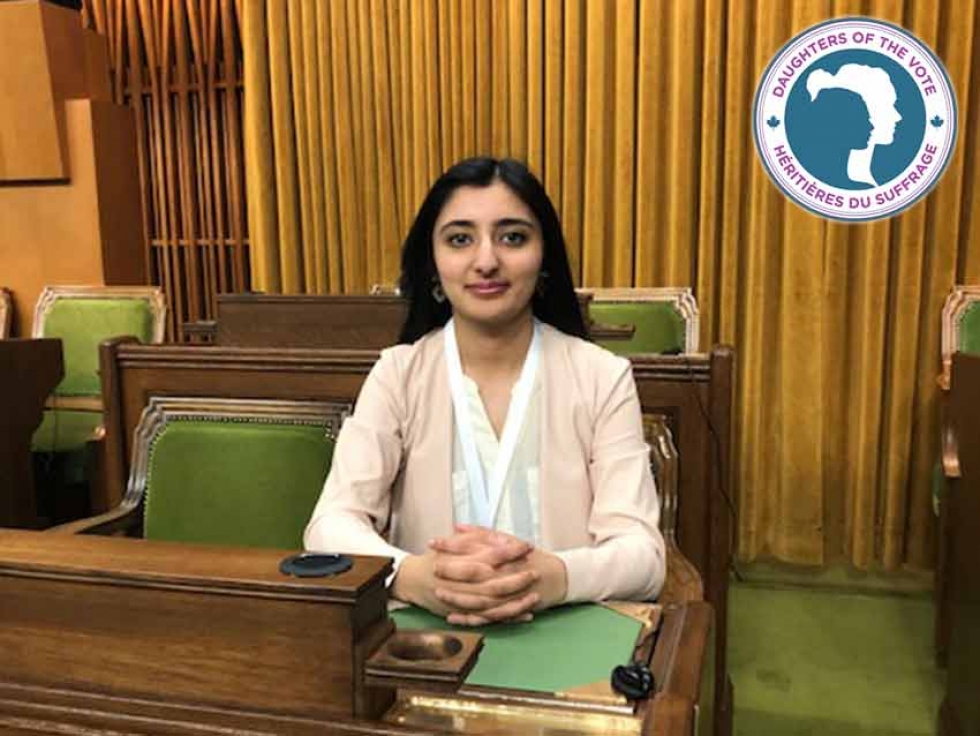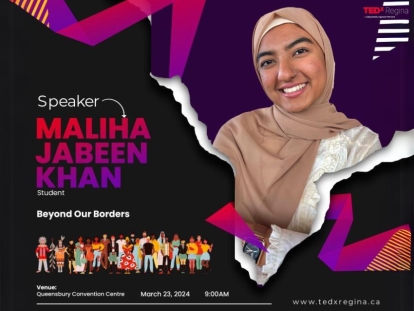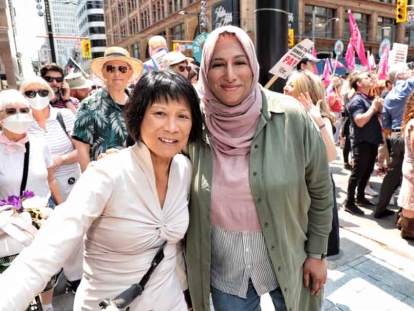 Pakistani Canadian Misbah Mahal represented the riding of Sturgeon River-Parkland, Alberta at Equal Voice’s second Daughters of the Vote gathering in early April 2019.
Misbah Mahal
Pakistani Canadian Misbah Mahal represented the riding of Sturgeon River-Parkland, Alberta at Equal Voice’s second Daughters of the Vote gathering in early April 2019.
Misbah Mahal
Apr
Muslimahs on Parliament Hill: Misbah Mahal from Sturgeon River-Parkland, Alberta
Written by Making HeadlinesPakistani Canadian Misbah Mahal represented the riding of Sturgeon River-Parkland, Alberta at Equal Voice’s second Daughters of the Vote gathering in early April 2019, which brought together 338 young women between the ages of 18 and 23, representing each Canadian riding and take their seat in the House of Commons during a historic sitting of the House of Commons. They were addressed by every federal party leader, and engaged with an array of Ministers, critics and advocates.
Daughters of the Vote (DoV) was aimed at encouraging more young women to become involved in Canadian politics, a space where there are still challenges to gender equity.
Muslim Link had the opportunity to interview several of the young Muslim Canadian women who were selected to participate in this historic event, including Misbah.
1. Tell us about yourself
Salam! My name is Misbah Mahal and I was born and raised in North America, having lived in both the United States and Canada. My parents were born and raised in Pakistan and immigrated to Canada over 25 years ago to create a better life for the family they dreamed of starting. I am a visible minority, practicing Islam, and often find it challenging to adapt to Western culture while still keeping my moral values at the core of my decision making. My interest in politics started from an early age, as my mom works for the federal government of Canada, and so I was interested in seeing what changes I could bring to the system. I am currently studying neuropsychology in my third year at the University of Alberta, and hope to pursue medicine, and impact politics from a medical standpoint. I have been part of the Pakistan Canadian Association of Edmonton and am very involved with the ethnic part of my community, volunteering at events around the city. I have been the organizer for social justice rallies in my city, bringing media attention to issues impacting Muslims abroad, such as the persecution of Muslims in Myanmar and the 1 million Uyghur Muslims currently being held in concentration camps in China.
2. Tell us about the riding your represented in the House of Commons. What challenges socially and economically is the riding facing? Do you feel that many in Canada know about and/or understand these challenges? How do you hope to increase awareness about the challenges your riding faces to broader Canadian society?
While attending Daughters of the Vote this past week. I represented the Sturgeon River-Parkland riding that is located just north of Edmonton, Alberta. My riding is currently facing many economic hurdles in relation to the problems with the trade deals involving canola. There is major set back to the farming industry as our ties with China have caused a resistance to the agriculture trade. In terms of the social implications, many people have become hesitant to start up farming in my area due to this issue, and many immigrants share this worry. They are worried that they will not be able to create a livelihood in this industry, as their lives may become threatened with international trade disputes. When my family immigrated to Canada, they knew they wanted to live on a farm and raise livestock. Everyday my family faces scrutiny and snide remarks from community members who try to create doubt in our minds about whether we belong. Some farmers are very courteous and make an effort to create an inclusive atmosphere, but these numbers are few. There needs to be a stronger encouragement to create more of an ethnic diversity in rural communities so that they can break these societal norms. Many Canadians are unaware of the challenges people of colour, and specifically Muslims face in rural communities, because they are not experiencing these problems while living in the city. It seems the immigrant populations automatically limit themselves to urban setting without considering that this lifestyle is accessible to them as well. Creating seminars for women of colour and on the broader scale, immigrant families, to learn about the farming process would create a great starting initiative. The allocation of resources to informing new comers that the rural lifestyle if accessible to them, would be a great way to remove the anxiety associated with becoming “othered” in a region that is dominated by caucasian men.
3. As young women involved in politics, what challenges, if any, do you face? Do you feel that the presence of more young women is changing politics? If so, how?
As a Muslim women of colour in a western nation, I face challenges everyday in overcoming obstacles associated with my identity. I am stereotyped for not having any knowledge in agriculture or wanting anything to do with the rural lifestyle. I have lived on a farm for pretty much my whole life, growing my own produce and raising horses, goats and other livestock, and everytime I tell someone about this they are shocked. It is the stigma associated with being a person of color and living in an area that is completely different from you, that creates this “otherness” that perpetuates a narrative that is simply untrue. In politics, this is seen through the hurdles associated with Muslim women having to prove to everyone around them they are running for office in order to better all of society and not just their own people. I think it is a challenge for many Muslim women to have to explain that they want inclusion for all people living on this land and they are not trying to just better their own race. People see Muslim women take a stand for equality and automatically assume they are targeting anyone not like them, which is simply not true. More women in politics creates diversity and equal representation of voice. Young girls will look up to these leaders and see that there is a chance for them to take part in the political process as well. It is crucial to bring a variety of ideas to the table and attack the problems from a wide range of angles.
4. Do you feel that there are also shifts in how young Muslim women are taking up leadership positions within Muslim community organizations in Canada? Do you feel that the presence of young women in these Muslim organizations is changing how these organizations function? If so, how?
Young Muslim women are becoming more involved in politics, through continuous efforts to push for diversity and inclusion through programs such as Daughters of the Vote. We are able to see ourselves in places of power, and become more driven to make it a reality. Having institutions recognize the benefit of diversity and having Muslim women in power, allows others to see that it is possible, and that we are are equal. Having been involved in the Pakistan Canada Association of Edmonton, I have participated in many election campaigns and noticed that diversity is an asset to any organization. The inclusion of these women allows for a variety of experiences and backgrounds to contribute to the overall breaking of systemic barriers that have held us back for centuries.
5. By attending DoV you had an opportunity to meet young women from across Canada. Did any of the realities they shared challenge you to unlearn some assumptions about your fellow Canadians or seek out knowledge about issues you had otherwise not known about your fellow Canadians ? Please elaborate.
Attending Daughters of the Vote with other young women, opened my eyes to the issues of the Indigenous not only in my community but across the country. Often, I find that the issues that the indigenous communities face, become grouped into one problem, when indeed they are unique to all the areas where they reside. The Inuit women from the Northern regions had stressed the issues of the murdered, missing and Indigenous women as one of their primary problems, whereas the Indigenous to the West of the country stressed the importance of fighting back against corporations to refrain from the building of the pipeline. I had not understood the complexity of the issues Black women face in Canada, until I spoke with them during this program. I became aware of the systematic oppression that still exists in Canada and the lack of support even within their own community. People of color must band together to fight against oppression, yet we all seem to be isolated in our own struggles.
7. By attending DoV you had an opportunity to meet young Muslim women from across Canada. Did any of the realities they shared challenge you to unlearn some assumptions you had about Muslims in Canada or seek out knowledge about issues facing Muslims in Canada you had otherwise not known about? Please elaborate.
By attending Daughters of the Vote I was able to see the diversity even among Muslims, such as the Muslims whose roots originated from Syria, Pakistan, Malaysia, and many more nations. These different women, had different appearances, ranging from light to dark skin, light eyes to dark eyes, and different clothing styles. Some Muslims, such as myself were not wearing a hijab, yet others were wearing their ethnic clothing. This shows that although in appearance we vary, we stood united to promote Muslims of all backgrounds to advocate for having access to the same positions in politics as men. The assumption that the struggles of all Muslims are the same is untrue, and media tends to portray the image of Muslims to be one unanimous image when indeed we are unique.
6. As was to be expecting with a federal election fast approaching, tensions between political parties were much more apparent during this DoV than back in 2017. One of the greatest challenges of our time is how societies are becoming more and more polarized. Unfortunately partisan politics plays a role in this polarization as parties focus on attacking one another instead of trying to build consensus for the common good. Do you feel that there is a need for a new culture of how politics is done in Canada in order to keep our democracy healthy and focused on the interests of all Canadians?
The fact that Daughters of the Vote is a non-partisan program allowed for all parties and ideologies to come together and express their opinions on the panels Daughters of the Vote held throughout the week. This was especially important as the delegates attending this program where coming from all walks of life. This allowed for greater diversity and did not create as much of a bias, which I was very appreciative of. The polarization within these societies, was heightened during my visit to the House of Commons as Prime Minister Trudeau had made the executive decision to remove two women from his caucus. Even within the supporters of the Liberal Party, this had created a greater division and a larger rift among these individuals. This opportunity had allowed for delegates to express their opinions in respectful manner, while also seizing this opportunity to address the issues central to them. This can also be seen by the attitude of the delegates when they walked out during Conservative Party Leader Andrew Sheer’s speech. In order to keep the issues focussed on Canadians, there must be a diversity of opinions. Without the inclusion of many voices, the focus will remain on a specific type of people, which I believe is the root cause of many of these problems, and the cause of much of this polarization.
7. As it is an election year, what will you be doing to try to get out the vote in your riding?
I will try to create a greater diversity among the voting population this year by visiting my local mosque to try to get them to vote. There needs to be outreach to the people of colour in more isolated areas within the rural population. The rural population, such as the one I currently live in, just outside of Edmonton, does not have any encouragement to participate in voting. Also it is a highly biased outreach system that is currently in place, having a voice for only the primary party that is supported to reach the doors of these residents. Immigrant families who are not approached by a variety of parties, may vote for a party without really understanding the choice they have. My goal is to reach out to these immigrant voters and inform them of the diversity of the parties running and turn them into informed voters. Leaving flyers and holding info sessions is something I will try to take part in, in order to create a larger awareness of the political voting process.
8. What is the key lesson from your experience at DoV that you will be taking back into your work in your riding?
The key lesson to take away from this program is that society in general is becoming more progressive and although the situation seems bleak at times, we have come a long way. I learnt that there are still many obstacles in place for people of colour which still need to be addressed, however people of colour must create a more unified bond amongst each other. There needs to be continued support even beyond Daughters of the Vote, and I have learnt the importance of voicing my opinions and showing solidarity for those that are marginalized in this society.
9. Is there anything else you would like to add?
I am grateful for the connections I have made throughout this program. I was able to connect with other Muslims and allow myself to learn about the struggles other Canadians face, and what I can do to be a true ally to these people. A great aspect of Daughters of the Vote was the applicable aspects of the skills learned in this program.There is room to implement these ideas to any career, as the principles of being proactive and confident in yourself is something anyone can apply no matter what they pursue. I will continue to be an ally to marginalized groups and will continue to show my support for those that need it. In turn I hope that even non-Muslims become our allies to help each other in battling systematic oppression and creating a more egalitarian society for all.
Follow Misbah Mahal on LinkedIn here.
This article was produced exclusively for Muslim Link and should not be copied without prior permission from the site. For permission, please write to info@muslimlink.ca.















